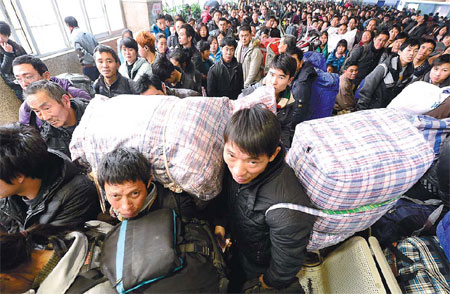Safe travel over Spring Festival a priority
Updated: 2013-01-18 08:02
By Zhao Lei (China Daily)
|
||||||||
|
Two migrant workers from Chongqing wait for a train home along with other passengers at a crowded railway station in Hangzhou, Zhejiang province, on Tuesday. Li Zhong / for China Daily |
|
A baby and mother are among the crowd waiting at a Hangzhou railway station. Li Zhong / for China Daily |
The Ministry of Transport has pledged to ensure travelers will enjoy safe and convenient journeys during the coming Spring Festival travel peak, a ministry spokesman said on Thursday.
"We will spare no efforts to guarantee the safety of passengers," He Jianzhong, who is also director of the ministry's policy and statute department, said at a news conference.
"The ministry has recently issued three directives to arrange and coordinate transport work during the travel peak of this Spring Festival, and six teams led by the minister or vice-ministers will start to inspect safety measures taken by local authorities from this Sunday."
Chinese tradition holds that people should return home and spend Spring Festival, otherwise known as Chinese New Year, with their families, leading to an annual travel rush that is the largest human migration in the world.
According to People's Daily, Chinese travelers made nearly 2.9 billion trips during the 2012 travel peak.
This year's peak period starts on Jan 26 and ends on March 6, and more than 3.1 billion trips will be made in cars or buses, averaging 77.41 million per day, 9 percent more than last year, according to the ministry's forecast. Meanwhile, about 43 million trips are expected to take place on ships during the 40-day period, a 1.5-percent increase year-on-year.
Transport departments around the country will allocate 840,000 buses and 13,000 passenger ships for the travel peak, He said.
Compared with the travel peak in 2012, this year will see more short or medium-distance journeys on the roads and a larger movement of migrant workers. In addition, there will be a surge in trips made by rural residents, the spokesman added.
Emergency plans
The ministry has prepared plans to avoid passenger congestion in the case of an emergency and will improve the links between rural and urban areas.
Management and supervision on long-distance coaches, especially chartered, and passenger transport enterprises will be tightened, and driving while fatigued will be severely punished, He said.
Ships' operations will be suspended if there is extreme weather, and transport authorities will intensify their checks of ports and vessels.
Transport departments will strengthen their communication and cooperation with public security authorities in the crackdown on illegal operations. They will also join hands with local governments to improve ticketing and information services.
Toll-free expressways
Specific guidelines have been made to accommodate passenger cars with fewer than seven seats in their travel on toll-free expressways from Feb 9 to 15, the seven-day Spring Festival holiday, according to He.
The State Council, China's cabinet, decided in August that most expressways should be toll free for passenger cars with fewer than seven seats during four national holidays. The move left the country's expressways witnessing skyrocketing traffic during the National Day holiday in October and many places reported serious jams on highways.
To address the side effects of the policy, expressway authorities will "streamline the passage of cars through toll gates, designate special lanes for cars eligible for the policy, and publish road information in a timely manner", He told the news conference, adding that local traffic officials have been asked to deploy emergency-response and rescue teams on expressway sections that are prone to accidents or congestion.
Long-distance coaches
To ease the workload of long-distance-coach drivers and reduce safety hazards, a trial program will soon begin in 13 provincial-level regions including Beijing, Jiangsu and Guangxi, restricting the long hours drivers work by switching drivers to keep them fresh.
Transport authorities will select large companies with good operation and safety records to carry out the program, which begins on Sunday. After driving a certain distance, a bus driver will be replaced by one of his counterparts at one of the route's stops. The shift will be conducted between 11 pm and 2 am.
Buses involved in the program will be allowed to operate overnight, He said, adding that the practice will be gradually promoted nationwide if the trial proves successful.
He also said the ministry is cooperating with the State Council's Legislative Affairs Office to draft the regulation of public transportation in urban areas, aiming to further boost public transport in cities.
zhaolei@chinadaily.com.cn
(China Daily 01/18/2013 page3)

 In Photos: 7.0-magnitude quake hits Sichuan
In Photos: 7.0-magnitude quake hits Sichuan
 Li Na on Time cover, makes influential 100 list
Li Na on Time cover, makes influential 100 list
 FBI releases photos of 2 Boston bombings suspects
FBI releases photos of 2 Boston bombings suspects
 World's wackiest hairstyles
World's wackiest hairstyles
 Sandstorms strike Northwest China
Sandstorms strike Northwest China
 Never-seen photos of Madonna on display
Never-seen photos of Madonna on display
 H7N9 outbreak linked to waterfowl migration
H7N9 outbreak linked to waterfowl migration
 Dozens feared dead in Texas plant blast
Dozens feared dead in Texas plant blast
Most Viewed
Editor's Picks

|

|

|

|

|

|
Today's Top News
Live report: 7.0-magnitude quake hits Sichuan, heavy casualties feared
Boston suspect cornered on boat
Cross-talk artist helps to spread the word
'Green' awareness levels drop in Beijing
Palace Museum spruces up
First couple on Time's list of most influential
H7N9 flu transmission studied
Trading channels 'need to broaden'
US Weekly

|

|









